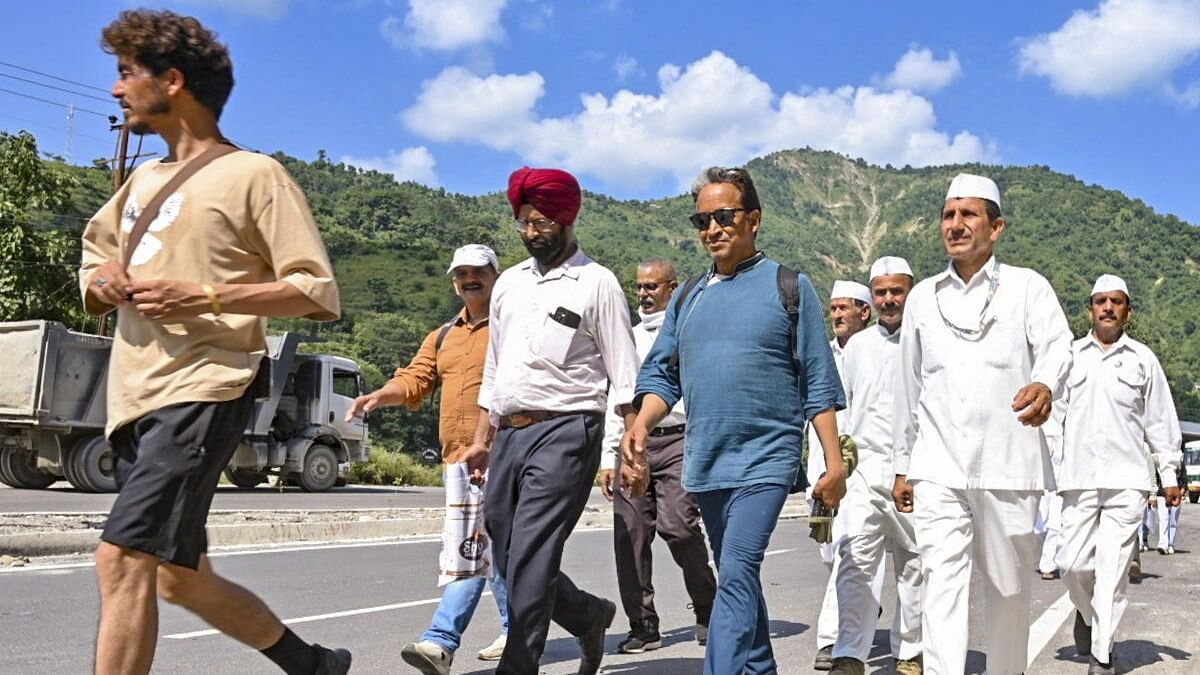
Climate activist Sonam Wangchuk during his foot march from Ladakh to Delhi demanding the inclusion of Ladakh in the Sixth Schedule of the Indian Constitution, in Mandi district, Himachal Pradesh.
Credit: PTI Photo
More than 100 volunteers from Ladakh, including climate activist Sonam Wangchuk, have begun a foot march to Delhi to demand constitutional protections for the ecologically fragile Ladakh region. Recently, landslides wreaked havoc in the eco-sensitive Wayanad in the Western Ghats. From Himachal Pradesh to Gujarat and Rajasthan, floods continue to make headlines. Even megacities such as Delhi and Chennai have not been spared from torrential rainfall and urban flash floods.
Over 80 per cent of India’s population resides in districts vulnerable to climate-induced disasters. The country faces escalating threats from rising temperatures, shifting rainfall patterns, depleting groundwater, retreating glaciers, intense cyclones, and rising sea levels. These changes pose significant risks to livelihoods, food security, and the economy. Urban populations are not immune to the impacts of global warming. Densely populated cities, particularly those with unplanned urbanisation, are at increasing risk from prolonged heatwaves, flooding, water stress, and the spread of diseases. The consequences of these climate-related challenges are expected to intensify, affecting the health, infrastructure, and overall resilience of urban areas.
The National Action Plan on Climate Change (NAPCC), unveiled in 2008, outlines a national strategy aimed at helping the country adapt to climate vulnerabilities while enhancing the ecological sustainability of India’s development path. The NAPCC includes eight National Missions, each representing multi-pronged, long-term, and integrated strategies to achieve key climate goals.
Yet, 16 years later, India is grappling with new challenges from abnormal weather patterns. Indian cities are no strangers to extreme weather or urban climate disasters. A coordinated effort to tackle climate change disasters is urgently needed. Domain experts in climate change could play a crucial role in developing a comprehensive strategy for both mitigation and adaptation in response to the increasing frequency of climate-induced crises. This must start with vulnerability assessments of different urban populations and the use of empirical evidence to develop a roadmap. A robust agenda might include establishing early warning systems, designing climate-resilient infrastructure, raising public awareness, and strengthening health systems to manage potential climate emergencies. Additionally, fostering cross-learning platforms among Indian cities and internationally, along with increasing investments in policy research, would be essential. India can draw valuable lessons from countries that have already made progress in these areas.
Climate disasters have far-reaching consequences beyond bio-physical damage, affecting social dynamics and disproportionately impacting women. An inclusive action plan that considers gender perspectives is crucial to effectively addressing these challenges. Studies have shown that heightened stress due to climate disasters can have direct health and psychological impacts as well as indirect impacts, such as an increased rate of domestic violence against women.
The public sector, which is responsible for critical policies to mitigate and adapt to climate change, needs a robust workforce of professionals with specialised training in climate risk management and sustainability. This was part of the deliverables outlined by the NAPCC in 2008, which stated that India required at least 200 specially trained climate change research professionals at the time. But how will the bureaucracy appoint and institutionalise these officers?
One possible solution is the lateral entry of experts, called the ‘Climate Change Officers’ (CCOs). The broad functions of these CCOs would include coordinating district-level efforts in climate-responsive development with various agencies, providing technical assistance to the local administrations, and engaging with local populations and citizen groups to understand their adaptation and mitigation needs. They would also be responsible for preparing a broad strategy at the state level to effectively preempt and manage climate-related disasters. CCOs could work closely with local institutions and environmental, social, and governance (ESG) professionals in the private sector to build public-private partnerships and solutions.
To further support local action and research, the Ministry of Environment, Forest, and Climate Change (MoEFCC), as the nodal ministry for climate action, could consider launching a “Climate Fellows” programme in association with partner states, modelled after the Prime Minister’s Rural Development Fellowship Scheme. This programme could offer an opportunity for young graduates to receive specialised training on climate change issues through a dedicated national boot camp and then be posted at district level.
Additionally, India needs to ramp up its climate-responsive infrastructure, reform the meteorological department, and streamline the coordination between the National Disaster Management Authority (NDMA) and CCOs.
To make our cities more resilient to climate stress, we must rely on local solutions and context-driven approaches.
(Rachit Seth is the founder of Policy Briefcase and. Aakash Mehrotra is an international development consultant)
